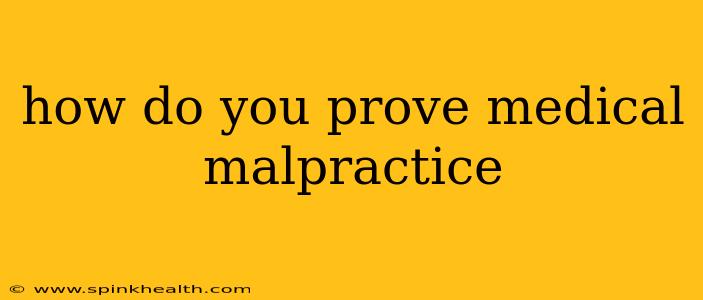How Do You Prove Medical Malpractice? A Journey Through the Legal Labyrinth
The sterile, clinical environment of a hospital can quickly transform into a battleground when medical errors lead to harm. Proving medical malpractice isn't simply about showing something went wrong; it's about demonstrating a clear breach of the standard of care, resulting in significant harm. It's a complex legal journey, often requiring expert testimony and meticulous evidence gathering. Let's navigate this challenging terrain together.
Imagine this: Sarah, a vibrant young woman, undergoes a routine surgery. However, post-operation, she experiences complications, leaving her with permanent disabilities. Suspecting medical malpractice, she embarks on a difficult path to prove her case. This is the story of many who find themselves in similar situations. The process is intricate, demanding a thorough understanding of legal principles and the medical field.
1. Establishing the Standard of Care: The Doctor's Duty
First, we need to establish what a reasonably competent doctor in the same specialty and geographic area would have done under similar circumstances. This isn't about judging a doctor's intentions – it's about whether their actions met the accepted professional standards. This often requires expert medical testimony, as only another doctor can reliably assess if the actions met this standard. Think of it like this: a plumber wouldn't be expected to perform brain surgery, and similarly, a cardiologist's actions would be judged against other cardiologists' practices.
2. Proving Breach of the Standard of Care: Did the Doctor Fall Short?
Once the standard of care is defined, it must be shown that the doctor deviated from it. Did the doctor fail to properly diagnose a condition? Did they use inappropriate treatment methods? Did they provide inadequate post-operative care? This again hinges on expert testimony, which acts as a crucial bridge between the legal and medical worlds, explaining complex medical procedures and analyses in understandable terms.
3. Causation: Linking the Doctor's Actions to the Harm
Proving a breach of the standard of care isn’t enough. Sarah needs to prove a direct link (causation) between the doctor's negligence and her injuries. This is arguably the most challenging aspect. Experts must testify that, more likely than not, the doctor's actions directly caused Sarah's harm. This may involve analyzing medical records, imaging scans, and other evidence to demonstrate a clear chain of events. Simply stating there were complications doesn't suffice; a direct causal connection is paramount.
4. Damages: The Extent of the Harm
Finally, Sarah needs to prove the extent of the damages she suffered due to the malpractice. This can include medical expenses, lost wages, pain and suffering, and any future medical expenses or lost earning potential. Detailed documentation, including medical bills, pay stubs, and expert testimony on the long-term effects of the injury, are crucial to establish the full extent of the damages.
Frequently Asked Questions (PAAs)
H2: What constitutes medical negligence?
Medical negligence occurs when a healthcare professional's actions (or lack thereof) fall below the accepted standard of care, resulting in harm to the patient. This isn't about simple mistakes; it's about a departure from established professional norms.
H2: What types of evidence are needed to prove medical malpractice?
The evidence required can be extensive, often including medical records, diagnostic images, expert medical testimony, witness statements, and any other documentation that supports the claim of negligence and its impact.
H2: How long do I have to file a medical malpractice lawsuit?
The statute of limitations for medical malpractice varies considerably by state. It's essential to consult with a legal professional in your jurisdiction to understand the specific time limits applicable to your case. These deadlines are strict, and missing them can bar your claim entirely.
H2: Do I need a lawyer to prove medical malpractice?
Given the complexity of medical malpractice cases, engaging a qualified lawyer specializing in medical malpractice is strongly recommended. These lawyers possess the necessary expertise to navigate the intricacies of medical legal proceedings, gather evidence, and present a compelling case. They have experience in dealing with the medical experts needed to testify in these cases.
The path to proving medical malpractice is arduous, requiring meticulous evidence gathering, compelling expert testimony, and a clear understanding of legal principles. It's a journey that demands both legal and medical expertise to navigate successfully. This information is for educational purposes only and is not a substitute for legal advice. Always consult with a qualified medical malpractice attorney to discuss your specific situation.

